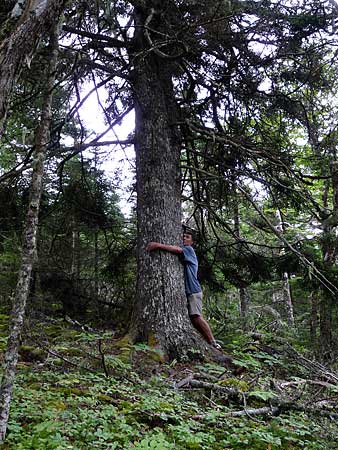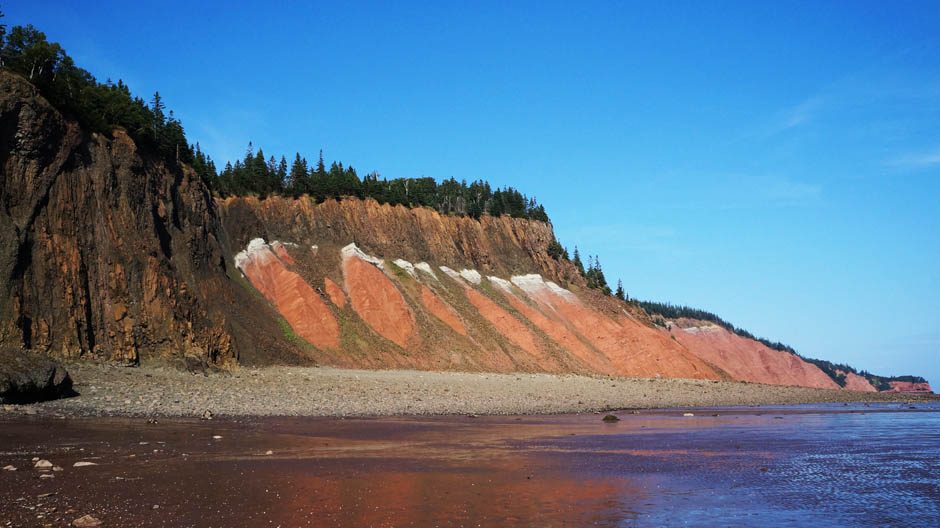 I don’t know if it was Bill Black who came up with the headline or the Chronicle Heralds, but predictably BLACK: Let’s stop hugging trees, start embracing industry (CH Jan 20, 2018) generated a lot of response.
I don’t know if it was Bill Black who came up with the headline or the Chronicle Heralds, but predictably BLACK: Let’s stop hugging trees, start embracing industry (CH Jan 20, 2018) generated a lot of response.
In the text, Black went after every resource issue currently on the radar in Nova Scotia – aquaculture, forestry, mining in protected areas, fracking, golf courses, his common theme being, apparently, concern over declining economic opportunities in rural Nova Scotia.
There were some great Trump-like lines, sure to infuriate many, and get a nod of approval from others, e.g.:
On clearcutting
Some people flying into Halifax find it upsetting to see evidence of a clearcut from the air. The trade-off is that it is safer for workers and helps the industry to be cost-competitive. Some of the wood is used as a bio-fuel, which is not great, but is much better than fossil fuels. The trees grow back. We are in no danger of running out.
On mines
Most mines are invisible except from the air.
On golf courses
It is instructive that the Cabot Links golf course (ranked No. 43 in the world outside the U.S.) is built on an abandoned coal mine. Building its sister course, Cabot Cliffs (ranked No. 9), required a lot of trees to be knocked down. Most of the discomfited birds, being mobile, will have found new habitat in the plentiful neighbouring forests. Those courses have brought enormous benefit to Inverness and the surrounding areas. They have revived what was a dying town. Yet at the hint that a third course may be built there are already voices of opposition.
I guess the Chronicle Herald saved up all of the responses and put them in their Saturday Jan 27, 2018 print ed. View:
COUNTERPOINT: Industry is handout-free? Who is Bill Black kidding?
Raymond Plourde CH Jan 27, 2018
Columnist and ex-Maritime Life CEO Bill Black’s blinkered boosterism for resource intensive/extractive industries is as tiresome as it is predictable (“Let’s stop hugging trees, start embracing industry” Jan. 20). So, too, is his breezy dismissal of the very real environmental impacts of those industries and the concerns of the many (mostly rural) citizens who have to live with the effects of heavy industries in and around their communities.
COUNTERPOINT: Employment vs. environment a false choice
Mike Lancaster CH, January 27, 2018
I hug trees and I embrace industry, just not ecologically destructive methodologies. Making it one or the other makes a nuanced issue oversimplified.
Under VOICE OF THE PEOPLE – Jan. 27, 2018:
– Dispassionate analysis needed (on Boat harbour) by RD, Halifax/Braeshore
Waste water with minimal treatment has been going into the Pictou Harbour/Northumberland Strait from the Boat Harbour treatment facility basically since the mill started operations. I’ve sailed through the dark brown water from Boat Harbour as far up as Lighthouse Beach at the entrance to Pictou Harbour when the tide was right. When the wind and tide were right, a light brown foam covered our beach at Braeshore.
Where are the data that indicate this partially treated effluent over the past decades has had a negative impact on lobster, scallop, crab and other fisheries?
– Change forest types by CS, Yarmouth
We’re in no danger of running out” sounds a lot like what we thought of codfish 50 years ago, or old-growth forests on the West Coast at the turn of the century. We have learned from past mistakes and Black’s mentality of limitless resource exploitation at the expense of our most valuable public good — the environment where we live — is out of step with most Nova Scotians.
Change forest types by TX, Wolfville
Crown lands should be cut on a sustained-yield basis: cut what you grow. Sawlogs and other byproducts can be selectively removed at this time. These clearcuts on Crown lands can be replanted, as is done in other provinces, under the direction of provincial officials. This is an opportunity to change the forest types.
Fish farming a flop by SL, Tangier
Re: Bill Black’s Jan. 20 column. It’s a bit ironic. A former insurance guy (Bill Black) defends feedlot fish farms. Has there been a worse bet in the last 20 years in Atlantic Canada?
Mining lobby off-base by Chris Miller, Canadian Parks and Wilderness Society
Less than 13 per cent of Nova Scotia is protected. That’s a very small number for the mining industry to be claiming to be a victim of an unfair balance. Clearly the balance is not tipped in favour of nature conservation — even more so when you consider that 96 per cent of mineral rights were avoided when the government identified new protected areas.
Thankfully, the Nova Scotia government has rightly concluded that mining protected areas is not good for the environment and has turned down the proposal to open up these spectacular areas to mining interests.
Thanks to the Chronicle Herald for publishing, it seems, most letters, op-eds etc submitted to them on these issues regardless of viewpoint.
